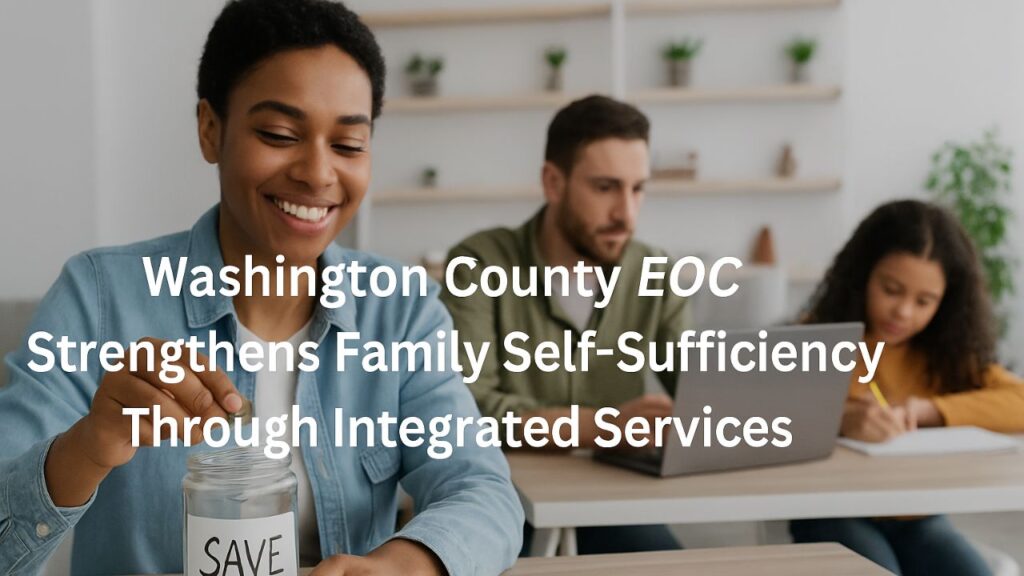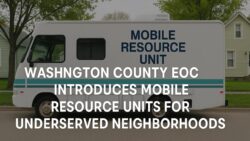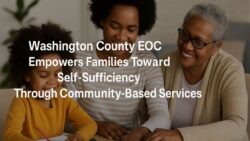Washington County EOC – In today’s challenging economic environment, families across the United States are increasingly in need of more than just temporary relief—they require long-term, sustainable support to achieve true self-sufficiency. Washington County Economic Opportunity Council (EOC) has recognized this urgent need and is transforming lives through its wide array of community-based family support services. By empowering families to build strong foundations, the EOC not only offers immediate assistance but also equips individuals with the tools to break the cycle of poverty and dependence. Their model focuses on integrated solutions that touch every aspect of family life—housing, nutrition, early education, financial literacy, employment, and mental well-being.
Washington County EOC serves as a critical bridge between vulnerable families and the resources that can reshape their futures. With a firm belief in community collaboration, they have created accessible pathways to essential services, ensuring that low-income households are not left behind. From young single mothers seeking job training to senior citizens struggling with fixed incomes, the EOC customizes its programs to meet people where they are—both geographically and emotionally.
At the heart of their mission is a commitment to dignity, compassion, and practical outcomes. In this article, we’ll explore how Washington County EOC is enabling self-sufficiency through its robust service network, share data-backed program outcomes, highlight departmental details, and provide a step-by-step understanding of how individuals can access these life-changing opportunities.
Family Development Programs Focused on Long-Term Impact
The EOC’s family development services focus on case management, education, and coaching to promote self-reliance.
- Individualized Family Plans based on needs and goals
- Case managers assigned to each family
- Referrals to health, housing, and financial services
- Parenting workshops and home visits
- Domestic violence prevention support
- Transportation support for appointments and jobs
- Monthly check-ins and evaluations
Key Metrics from 2024 Impact Report
The following table highlights the reach and success of family support programs in 2024:
| Program Component | Families Served | Success Rate | Avg. Duration | Partner Agencies | Key Locations | New Enrollments | Goal Completion Rate |
|---|---|---|---|---|---|---|---|
| Family Development | 520 | 83% | 6 months | 12 | Hudson Falls, Salem | 142 | 78% |
| Early Childhood Programs | 410 | 89% | Year-round | 8 | Cambridge, Granville | 103 | 85% |
| Housing Stability Assistance | 290 | 75% | 3-6 months | 5 | Fort Edward | 98 | 70% |
| Emergency Food Support | 860 | 92% | On-Demand | 10 | Throughout County | 220 | 91% |
| Youth & Teen Programming | 180 | 95% | Semester Based | 6 | Greenwich, Argyle | 67 | 93% |
| Mental Health Referrals | 130 | 88% | Varies | 4 | Countywide | 36 | 80% |
| Financial Literacy Workshops | 340 | 78% | 4 Weeks | 3 | Online + In-person | 110 | 82% |
| Employment Readiness | 275 | 84% | 2-4 Months | 7 | Whitehall, Hudson Falls | 90 | 76% |
Early Childhood Support: A Foundation for Future Success
Early childhood education and support is central to breaking generational poverty cycles.
- Head Start and Early Head Start programs for children 0–5
- Developmental screenings and health checkups
- Nutrition programs and meals included
- Parent engagement activities and family nights
- Transition support to kindergarten
- Bilingual staff for non-English-speaking families
Head Start Enrollment Guide for 2025
| Program Type | Age Group | Enrollment Start | Locations | Seats Available | Application Mode | Required Documents |
|---|---|---|---|---|---|---|
| Early Head Start | 0–3 years | March 1, 2025 | Fort Edward, Salem | 60 | Online/In-Person | Birth certificate, ID, income proof |
| Head Start | 3–5 years | March 15, 2025 | Hudson Falls, Cambridge | 120 | Online/In-Person | Birth certificate, ID, residency proof |
Housing Stability and Crisis Prevention Services
Stable housing is critical to family development and well-being.
- Emergency rent and utility assistance
- Short-term shelter referrals
- Landlord mediation services
- Permanent supportive housing navigation
- Weatherization services for safe living conditions
Eligibility Requirements for Housing Assistance
To qualify for EOC housing services, applicants must:
- Be a resident of Washington County
- Demonstrate financial hardship or income below 125% FPL
- Have lease/rental agreement or documented housing instability
- Provide identification and proof of income
Economic Empowerment through Employment and Finance Programs
EOC’s employment readiness and financial education tools help individuals reclaim independence.
- Resume writing and job placement coaching
- Skill certification training (CPR, CDL, CNA, etc.)
- Budgeting and debt management classes
- Volunteer Income Tax Assistance (VITA)
- Credit rebuilding workshops
Community Voices – Real Life Success Stories
Residents have shared incredible feedback on these empowerment programs:
- “I never thought I’d have a career, but after the EOC’s job coaching, I landed a job at a hospital in Fort Edward.” – Samantha J.
- “The budgeting classes helped me clear $3,000 in debt and start saving.” – Ronald K.
Community Collaboration and Outreach Initiatives
Washington County EOC operates in close coordination with public, private, and nonprofit organizations to ensure services reach those most in need.
- Monthly mobile resource units to rural areas
- Food drives, school supply events, winter coat distribution
- Community garden partnerships for fresh produce
- Youth leadership and mentoring programs
- Inclusive programs for seniors and individuals with disabilities
Locations Offering Community-Based Family Services
EOC centers and mobile units are placed strategically to enhance access:
- Fort Edward – Main Office and Family Development Center
- Hudson Falls – Employment Services and Early Childhood Center
- Salem – Housing Assistance and Head Start Programs
- Cambridge – Youth & Nutrition Support Programs
- Granville & Whitehall – Community Food Distribution & Casework
Departmental Contact Information
For more details, residents can contact the following departments:
| Department | Contact Person | Phone Number | Office Hours | |
|---|---|---|---|---|
| Family Development Services | Tara Holmes | (518) 746-2390 | tholmes@washco-eoc.org | Mon–Fri 9am–5pm |
| Early Childhood Education | Megan Walker | (518) 746-2420 | mwalker@washco-eoc.org | Mon–Fri 8am–4pm |
| Housing Support | Raymond Brooks | (518) 746-2455 | rbrooks@washco-eoc.org | Mon–Fri 9am–5pm |
| Employment Assistance | Jenna Lewis | (518) 746-2481 | jlewis@washco-eoc.org | Mon–Fri 9am–5pm |
| General Inquiries | Main Reception | (518) 746-2390 | info@washco-eoc.org | Mon–Fri 9am–5pm |
Washington County EOC has proven that empowering families goes beyond handouts—it’s about providing hope, support, and structure. Their approach nurtures dignity while setting the stage for lasting independence, especially for those most overlooked. For any Washington County resident facing hardship or looking to build a better future, the EOC stands ready as a dependable, community-driven partner.
FAQs
Q1. Who can apply for services from Washington County EOC?
Anyone residing in Washington County facing economic hardship or crisis may apply.
Q2. Are the services offered by EOC free?
Yes, most core services including food support, job coaching, and case management are free.
Q3. How can I enroll in the Head Start Program?
You can enroll by contacting the Early Childhood Education department or visiting the EOC website during the open enrollment period.
Q4. What documents are needed for housing assistance?
You will need proof of income, ID, rental agreement, and a completed application form.
Q5. Can I access EOC services if I live in a rural part of the county?
Yes, the EOC has mobile resource units and satellite offices to serve rural communities.




